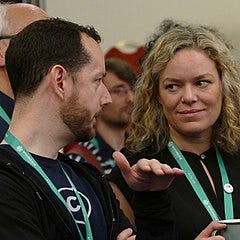The Top Ten Wikipedia Stories of 2019
This blog post marks the tenth consecutive year this website has contemplated the most important events, trends, and phenomena affecting Wikipedia and the wider Wikimedia community over the prior twelve months. Ten years is a long time—slightly more than half of Wikipedia's own history up to this point.
The very first installment of this series arrived in late 2010 as an "easy-to-write, easier-to-read listicle" but within a couple of years had become a multi-chapter mini-essay project delivered with a solemnity not unlike the closing of a particularly bitter RfC. A few themes came and went: Gamergate, Wikipediocracy, and the Knowledge Engine. Some persisted: Wikipedia's gender gap, paid editing investigations, and tensions between the Wikimedia Foundation (WMF) and its community. Others fell away entirely: the once-declining number of editors eventually stabilized and even ticked upward, and once-hostile educators learned to love Wikipedia.
Eventually, the decade turned: the "good internet" techno-optimism of the aughts and early 10s gave way to the "fake news" hellscape of the Trump era. Wikipedia, to its credit, continued doing just as it always had. Recently, the progressive website Mother Jones declared Wikipedia a "hero of the 2010s" for being a "a true project of the commons at a political moment when the very idea of the mutual good is under assault."
Indeed, Wikipedia has much to be proud of over the past ten years. No other major website has succeeded as a nonprofit, and no other nonprofit has leveraged its authority quite so effectively in the digital space. Wikipedia is a focal point for both the technology industry and the open access world. Even its controversies usually involve efforts to misappropriate Wikipedia's reputation for independence and accountability. Wikipedia is something almost everyone can agree on.
So, how did these themes play out over the past year and decade that was?
♦ ♦ ♦
10. The media's undying fascination with Wikipedia
Almost twenty years into Wikipedia's existence, you'd think that the news media would have finally grown bored of stories about how things work behind the scenes at Wikipedia. If so, you would be wrong.
This year brought a cavalcade of deep dives into the Wikipedia community, including: "The Dumbest Wikipedia Edit War of the Dumbest Decade" (Gizmodo); "Wikipedia has a Google Translate problem" (The Verge); "Checking the Web on Hunter Biden? A 36-year-old physicist helps decide what you’ll see" (The Washington Post); "Socked Into the Puppet-Hole on Wikipedia" (Wired); "Election Results Mean All Nighters For Politicians, Pundits—And Wikipedia Editors" (Fortune); "Well It Sure Was a Big Year for the 'Call-out Culture' Wikipedia Page" (Jezebel); "How Hong Kong's keyboard warriors have besieged Wikipedia" (Reuters) "Meet the man behind a third of what's on Wikipedia" (CBS News); and "A Brief History of NRA Employees Editing Wikipedia for Fun and Possibly Profit" (Splinter, RIP). That is a lot of interest in how Wikipedia works, especially considering there are fewer working journalists than ever. Maybe they're just interested in something on the internet that seems to be working as promised.
Not surprisingly, the coverage tended to come from technology-focused sites. But and politics and culture outlets from The Washington Post and Slate to to the entire archipelago of former Gawker sites published multiple Wikipedia-focused pieces. While The Wikipedian's coverage has slowed considerably in the last few years, it's encouraging to see that in-depth explorations of the dynamics behind the world's most popular reference source continue to flourish.
9. Narrowing Wikipedia's gender gap
Oh yes, it's still here (first appearance on this list: 2011), and it, too, quite literally still makes news. In 2019 the New York Times, The Guardian and Fast Company were among numerous outlets to publish pieces pointing out that Wikipedia's editor community skews heavily male (as does the site's collection of biographical entries).
Remarkably, the reason everyone knows about the disparity is because Wikipedia has made a point of keeping it in the discussion. The Wikimedia Foundation published its first report on the demographics of Wikipedia users in 2010, and by the end of the decade many groups and initiatives existed for the purpose of bringing more women into the fold. Have they had an impact?
Given follow-up analysis after the first survey, which found a modest improvement a couple years later, it seems plausible that the answer is yes. [Update: It turn out I have mischaracterized the analysis, which was a re-interpretation of the same data. Nevertheless, my optimism remains unchanged.] With every year that passes, a new cohort grows up with Wikipedia—and receives increasing encouragement to participate. But as the saying goes, more research is needed.
8. Everything is (getting more) connected
In 2004, Jimmy Wales described Wikipedia's mission as providing "free access to the sum of all human knowledge". These days, this quote applies less to Wikipedia itself—which has all kinds of limitations on what it deems worthy of inclusion—and more to Wikidata—which really does want to describe everything in the known universe. 2019 was a big year for the open data knowledge base, particularly in the acceleration of content being made available to it from various institutions—including the Smithsonian, the Metropolitan Museum of Art, and the Cleveland Museum of Art, among others. The trend is likely to continue in 2020 as integration with Wikidata becomes more widely accepted among archives and museums.
But Wikipedia is not left out: this year the Internet Archive launched an initiative to enable the display of actual pages of books cited as sources. As of November, approximately 130,000 citations had been connected to 50,000 books in multiple languages, with more on the way. The Internet Archive is much less famous than Wikipedia, but it deserves a lot more credit than it gets for preserving and distributing open knowledge. (Last year's list celebrated another of its projects, to rescue and restore links to millions of Wikipedia citations that had previously succumbed to link rot.)
It's interesting to me how for-profit Google and not-for-profits Wikipedia and Internet Archive all describe their mission as in some way about collecting and organizing the world's information. It always reminds me of the final pages of Don DeLillo's 1997 novel Underworld:
There is no space or time out here, or in here, or wherever [this] is. There are only connections. Everything is connected. All human knowledge gathered and linked, hyperlinked, this site leading to that, this fact referenced to that, a keystroke, a mouse-click, a password—world without end, amen.
This passage predates Google (founded 1998) and Wikipedia (2001), but not the Internet Archive (1996). It seems a stretch to say that DeLillo was inspired by the Internet Archive, but they are certainly carrying that hyperconnected vision forward.
7. Wikipedia or Wikimedia?
Everyone knows what Wikipedia is, but very few know what “Wikimedia” means. The word was coined in 2003 to name the new non-profit overseeing Wikipedia and other wiki-based sites which had begun to spin off it. Hence the Wikimedia Foundation. The problem is this split branding can be confusing, especially when trying to explain Wikipedia and the Wikimedia movement (see? it's a mouthful) to new audiences.
In 2019, the debate ramped up as the WMF hired a major branding firm, Wolff Olins, to help decide whether or not it should retire the m-word and simply become the Wikipedia Foundation. Although the rationale is clear enough, the counter-arguments are compelling, too. Wikipedia has long been the most important project of the WMF, but Wikidata very much seems like the future. Is it too late to make this change?
In May, the WMF published the results of a multi-part survey asking community members and affiliate groups what it thought of the idea. Some participants objected to the WMF’s methodology, claiming the criteria was selectively interpreted to show more support than actually exists. Some also faulted the fait accompli presumption that the change will inevitably be made unless significant opposition is discovered, in part because it does seem kind of like the WMF is actively trying not to find it.
Nevertheless, the topic is slated for discussion at two conferences in the first half of 2020. No one knows exactly what will happen, but if the change occurs, look to the Wikimania conference in August for a possible announcement.
6. Wikipedia meddling for face-saving and profit
Also in May, the outdoor lifestyle company The North Face and its ad agency Leo Burnett announced, proudly and quite inexplicably, that they had manipulated Wikipedia’s images of scenic hiking destinations to include its own clothing with logos fully visible, in order to dominate Google Images search results for said outdoor locations. The response was swift and fierce, and the images were deleted. Both companies seemed blindsided by the blowback from Wikipedia and the press (see: Adweek, PR Week, Fast Company) even though Burger King had come in for criticism for a similar stunt in 2017. (Also covered in that year's list.) Each put out terse statements of apology, and the world moved on.
Less noticed but just as interesting, NBC News hired a PR consultant to influence Wikipedia’s treatment of subjects it cared about by engaging in discussions on their behalf on relevant talk pages. (Necessary disclosure: my company, Beutler Ink, provides similar Wikipedia consulting services.) These subjects included former anchor Matt Lauer and president Noah Oppenheim—accused of sexual misconduct and subsequent cover-up, respectively—which made everyone uneasy. As reported by noted secret account discoverer Ashley Feinberg, the consultant was “verbose” and “relentless” and his suggestions were sometimes debatable, but also “allowed within Wikipedia’s guidelines”. The nuance probably contributed to the limited outrage, although the story popped up again when it was included in Ronan Farrow’s book Catch and Kill.
Oh, and remember Status Labs, formerly known as Wiki-PR? Yeah, they’re still around, and in December the Wall Street Journal nailed them again for undisclosed paid editing, including on behalf of Theranos, the notoriously fraudulent and now-defunct medical startup. Maybe they’ll start following Wikipedia's rules now? Hahaha, yeah right.
5. Wikipedia co-founders keep trying for another big score
The 2017 and 2018 installments of this list included mentions of famous Wikipedia co-founder Jimmy Wales' post-Wikipedia attempts to become an internet billionaire, most recently via WikiTribune, a news site he first previewed in his 2013 Wikimania keynote. In October, Wales pivoted to WT.Social, a site intended as an ad-free, user-supported social network to compete with the fake news and clickbait of Twitter and Facebook.

There are reasons to think it could work: Wales' fame means that WT Social has got a fair bit of coverage, including pieces from Business Insider and the BBC, and it had more than 400,000 members when I signed up to check it out around New Year's. The pivot also sort of resembles the one Wales made from Nupedia toward Wikipedia, and that move seemed to work out. But there are reasons to think that this abrupt turn will not: it's already struggling under the weight of its not-that-explosive growth, its espoused "news focus" will surely limit its appeal, and maybe we actually, you know, like our social networks clickbait-y.
Elsewhere, long estranged and non-famous Wikipedia co-founder Larry Sanger spent a couple years with Everipedia, an SEO strategy calling itself an encyclopedia that is somehow also a blockchain startup. (Also covered in our 2017 list.) In the honeymoon phase, Sanger promised that Everipedia would "change the world" far more than Wikipedia, but in October of this year, he departed and announced he would be leading a new project called the Encyclopshere: a distributed network of encyclopedias. If it materializes, this would actually be Sanger's third try at building an encyclopedia to improve on Wikipedia. (Why not just revive Citizendium?)

Everipedia never made a lot of sense, and neither does Encyclosphere. Each competitor lobbed criticisms at Wikipedia that ranged from valid to puzzling without making a persuasive case for an alternative. The truth is that the quotidian labors of writing, editing, evaluating, arguing, and consensus-building is the real work of creating an encyclopedia, and this is vastly more difficult to realize than starting a new website with a different philosophy about how to store the ones and zeroes.
Call me crazy, but Wales and Sanger almost sound like they have compatible visions! Perhaps a team-up is in order.
4. Staff changes at the Wikimedia Foundation
The WMF had a turbulent middle of the decade. In 2014, this list was bookended by items about the hiring of then-executive director Lila Tretikov, the next year it included kind of a blind item about various staff departures, and the year after that four separate items related to Tretikov's messy removal and replacement by Katherine Maher, previously the chief communications officer. The three-and-a-half years since have been considerably smoother, but less so in 2019, and we're probably closer to the end of Maher's tenure than the beginning.
Once again, the last year has seen some major departures at different levels, and the surprising announcement that the entire Community Engagement department would be shuttered. The executive formerly in charge, who had been with the WMF for less than a year and whose style was widely viewed as abrasive, transitioned into one of those dignity-preserving "consulting" contracts so popular in Silicon Valley. The remaining Community Engagement staff has been dispersed to other departments.

In August, Maher hired a chief of staff, Ryan Merkley. The position had been empty since it was briefly filled by a former Army / DIA / Hillary '16 official who had been viewed by some in Wikimedia circles as an odd fit. Not so Merkley: he arrived at the WMF after serving as CEO at Creative Commons. But this raised eyebrows, too: why would the leader of one open access institution leave to become second fiddle at another, unless he was being groomed as a successor? Also lurking in the background: complaints about how Merkley had handled sexual harassment claims in his previous role. (Merkley says he did so properly.) Will the matter come back to haunt the WMF? It probably depends on how long Maher plans to stay.
3. Wikipedia, enemy of authoritarian regimes
In 2015 China blocked access to Wikipedia's servers within its borders, and in 2017 Turkey followed suit. The reason is simple: Wikipedia provides access to information that these governments do not like. In May, the Wikimedia Foundation filed a petition with the European Court of Human Rights to make Turkey explain itself, and in December the country's highest court ordered access to be restored as a matter of human rights. As of this writing, however, Wikipedia has not yet been made available in the country. (This year, China also made sure that absolutely no language edition of Wikipedia can be accessed by its users.)

Russia has also blocked access to Wikipedia intermittently in recent years, choosing to selectively block access to specific Wikipedia pages until the HTTPS transition made this impossible. In November, Vladimir Putin announced a plan to digitize Russia's national encyclopedia, the Great Russian Encyclopedia, which had previously been published between 2004 and 2017, and which is controlled by a central authority (not that you'd really expect otherwise).
By the way, Australia is not an authoritarian state, but nor does it have a constitutional right to free speech, and this year Wikipedia was cited by an Australian court for ignoring a gag order about reposting information relating to Cardinal George Pell's conviction for rape and sexual abuse. For all the United States' faults, the First Amendment continues to be the best ally Wikipedia can have.
2. Movement strategy could use some strategery
Just because you have a non-profit with a clear mission statement does not mean that you don't have to make adjustments over time. And so for the last three years the Wikimedia Foundation has been working on something it once called "Wikimedia 2030”—because it asked participants to imagine what the Wikimedia project should look like in 2030—but now just calls Movement Strategy. Perhaps to forestall any jokes about how it really means it wouldn't be finished until that year?
For those involved, it's been a struggle, maybe even a boondoggle. Working groups have been convened and disbanded without arriving at a consensus view; endless conferences and conference calls have failed to reconcile the sprawling directions it has taken. To cite one example of disorder: at Wikimania 2019, the working groups presenting couldn't even agree on a number scheme for their presentations.

Later in the summer, strategy participants were called to a last-ditch "harmonization" retreat in Tunisia to finally get it right. But this meeting too seems to have raised more questions than answers. In particular, an emerging theme of decentralizing the WMF—shrinking its size, spinning off dedicated groups, and devolving decision-making to chapter affiliates—was met with pushback by senior leadership. Word now is that yet another effort is underway to rewrite / reconcile the strategy for presentation to affiliates at the upcoming Wikimedia Summit in Berlin in April, but no one is quite sure what it is going to say. A new movement strategy could be a good thing—but right now it feels like process for process' sake.
1. Framgate
In June, the Wikimedia Foundation did something highly unusual: it issued a one-year block for a longtime and very active Wikipedia contributor named Fram, who had been accused of behaving in an abusive manner toward other editors. While the WMF had blocked contributors before, these had always been permanent. Not so here. What could be so awful that it merited a ban, but one with an expiration date? And why didn't they offer an explanation?
Reaction from the community was explosive, and divided. Fram was a highly productive contributor, but also one with sharp elbows. Wikipedia has faced plenty of criticism from within and without about harassment problems on the website, and here the Trust & Safety team had ostensibly stepped up to do something about it. But the way they did it left a bad taste, and led, somewhat ironically, to a loss of trust between the WMF and its community.
The next day, another editor unblocked Fram, only for the WMF to swiftly restore the block and remove the administrator rights of the editor who had restored him. A string of administrator resignations ensued, and nearly 50,000 words were devoted to the community's internal debate about how to respond. [Update: Actually, I missed the archive pages so the true number may be thousands more.] As a result, the controversy drew far more press attention than anyone expected. BuzzFeed published a lengthy piece with an overreaching title, "The Culture War Has Finally Come For Wikipedia”. Both The Signpost and Slate settled for a slightly more circumspect description, calling it a "constitutional crisis".
Indeed, the WMF and its community share some powers, which are not always clearly delineated. The 2030 strategy is supposed to clarify things, but obviously that process had not been resolved by the time Framgate came along. In September, ArbCom decided to vacate the block, but not to restore his administrator privileges. Once again, the WMF said nothing.
♦ ♦ ♦
Folks, this thing is long enough as it is, so I am going to do us both a favor and stop writing after one more sentence. Please send any corrections to thewikipedianblog@gmail.com, and thanks for reading!
Previous installments: 2010, 2011, 2012a, 2012b, 2013a, 2013b, 2014, 2015, 2016, 2017, 2018
Image credits, in order of presentation: Slowking4, The North Face, Zachary McCune, Larry Sanger, Kritzolina, Wikimedia Foundation, Sailesh Patnaik. All images CC-BY-SA except The North Face.




